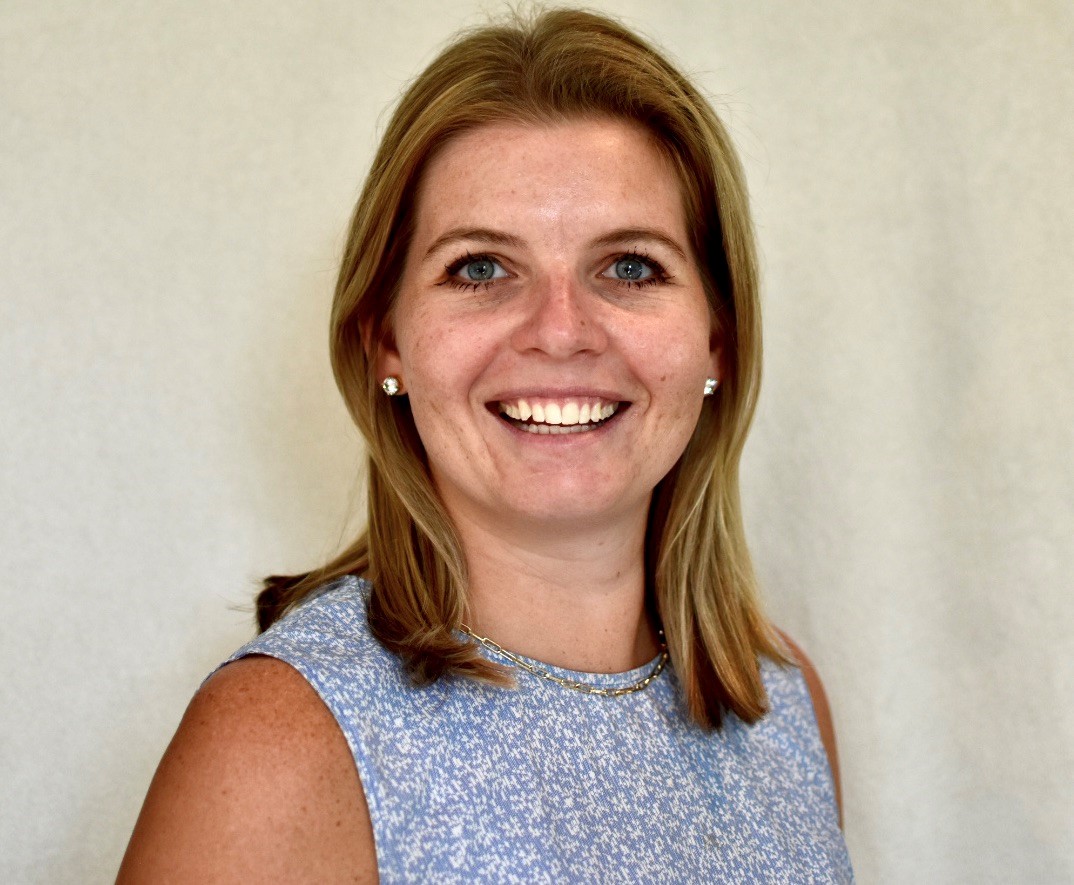
Christina Kjaeroe started her career at NFP in October of 2018 as an assistant vice president. In her role at NFP, she is the point person for some of the firm’s most successful referral sources, while managing a growing book of business. Relationships remain critical to her success and she’s learned a lot along the way.
Here’s what Christina had to say when we asked her about building relationships at work:
GenHERation®: On your first day working at an organization, what is most important to keep in mind?
Christina Kjaeroe: Starting a new job has changed considerably in the middle of a global pandemic, so some of my advice may not be applicable until we are all working in our offices again. First and foremost, it is always important to be friendly, in person or on Zoom. Give off a positive vibe, smile, and don’t be shy. It’s important to get to know your new colleagues, so be proactive in connecting virtually. Obviously, it is vital to know the people on your specific team, but take it a step further and learn about co-workers who work on different teams. Take mental notes of what people do, how long they have been with the company, and when you’re back in the office, where they sit. Then, figure out how your role fits in with theirs and what you can learn from them—this will help your professional career in the long run.
GenHERation®: What are two steps you can take to build your network at work?
Kjaeroe: First, use LinkedIn. Take the initiative and connect with your co-workers, even as soon as your first day. If a co-worker doesn’t initiate the connection, it doesn’t mean they don’t want to connect with you. People are balancing a lot of priorities, so make it easy on them and reach out first. This will also help you put names and faces to titles. Second, when you’re back in the office and it’s safe to interact at work, use your breakroom! So many people go out for lunch or eat at their desk. Eating alone is not a way to meet people and build your network. When you’re in the breakroom, seize the opportunity to strike up conversations and connect with people you don’t know. As many continue to work from home, take time to make virtual connections via email or the company intranet to establish a foundation that you can build on when you can connect in person.
GenHERation®: How can you connect with co-workers who work in different departments?
Kjaeroe: Get involved! A lot of companies have different events or networking groups that you can join. These are similar to the clubs you have in high school and college. For example, many companies have employee resource groups, kickball or softball leagues, and host charity walks or group activities out in the community. When I first started working at NFP, I joined our office’s Fun Committee. This group plans events and celebrates birthdays. Joining the Fun Committee gave me a great opportunity to connect with my entire office.
GenHERation®: What steps can you take to find a mentor at work?
Kjaeroe: First, talk to your manager or HR department to see if there is a formal mentorship program. Many companies have formal mentorship programs, but rely on word-of-mouth promotion that can sometimes lead to a lack of awareness. If your organization doesn’t have one, ask someone you respect, trust, and get along with to be your mentor. Your mentor can be in a higher position than you are or a peer. I have many mentors right now and some of them have less work experience than I do. For the mentors and mentees on my team, we schedule weekly 30-minute calls (that we stick to diligently) to touch base; however, mentorship doesn’t have to look this formal. Also, remember that if you don’t have a mentor right now, that’s okay. Finding the right mentor can take time and it usually happens naturally (and sometimes when you least expect it).
GenHERation®: How can you demonstrate that you are a good team member?
Kjaeroe: Right from the start, communication is critical. Don’t worry about overcommunicating. Be honest about what you do and don’t know. No one expects you to know everything when you first start out, so take advantage of this by asking questions and taking notes. Additionally, have empathy and show people that you care. You don’t know what people are dealing with in their personal lives, so try to give them the benefit of the doubt. If you see someone is struggling, ask if you can help—pitch in and be flexible. Embrace the golden rule and treat people the way you want to be treated.
GenHERation®: What communication channels should young professionals be versed in to be effective in the workplace?
Kjaeroe: Every organization has their preferred method of communication, whether it’s Zoom, Workplace, Microsoft Teams, or Slack. Become familiar with whatever your team uses and master it. However, no matter where you work, the most important thing you need to be able to do is pick up the phone and talk to people. We have become a generation that hides behind emails and text messages and we’ve all had experiences with misunderstandings in digital communications. If you have a question or if something isn’t clear, call the person—not all calls need to be scheduled and on the calendar. One five-minute phone call can save sending 10 emails back and forth.
GenHERation®: How can you connect with professionals in your field, outside of work?
Kjaeroe: Look into networking events, ideally in person, but virtually for now. For example, you can get involved with GenHERation® to connect with female professionals at NFP. One way I have met a lot of people is by going to art events in New York City. By simply talking to people, I have connected with a lot of fun and interesting professionals. You can also see if your company will cover costs to attend professional development opportunities, such as conferences (many are still happening virtually). In general, always be talking to people and never leave the house without your business card. A business card allows someone to remember you and opens the door for future conversation.
GenHERation®: What is the key takeaway you have when it comes to building relationships at work?
Kjaeroe: Embrace the golden rule and treat people the way you want to be treated. Also, while you should always be professional in the workplace, you can still be human. It’s okay to express emotion and be nice.
Christina graduated from Lehigh University in 2012 with a Bachelor of Science in Marketing and a minor in Graphic Design. She always imagined she would go into print advertising (a dying industry in today’s digital world!) when a call from a young alum her senior year changed her career path. She took a job at a boutique, high-end personal insurance broker in New York City. She worked there for just over six years learning the ins and outs of the personal property and casualty insurance world, as well as client service for successful individuals and their families. She managed new business flow, completed annual reviews, handled claims, and processed daily tasks for the firm’s VIP clients. Christina started her career at NFP in October of 2018 as Assistant Vice President. In her role at NFP, she is the point person for some of the firm’s most successful referral sources, while managing a growing book of business. Her favorite part of her job, however, is mentoring some of the team’s more junior members. She loves watching them grow and develop, and finds great pride in seeing her mentees succeed. In her spare time, Christina enjoys a good book, an even better spin class, and a leisurely round of golf. She lives in Hoboken, NJ with her miniature dachshund, Pippi.



Comments (0)